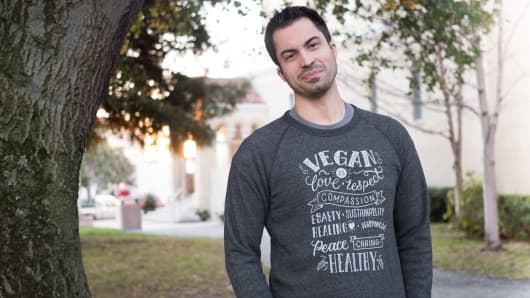
分享了 VEGUE 唯素主義的貼文
https://www.cnbc.com/2017/08/11/vegan-mafia-food-investor-network-includes-bill-maris-kyle-vogt.html
VEGUE 唯素主義
8月16日 9:00 ·
<重點節錄>
【純素黑手黨 (Vegan Mafia)】是美國一群權高位重的素食者,專門投資一些可以讓人戒掉動物製品的新創公司。 😎
😎
純素黑手黨其中一員 Ryan Bethencourt (萊恩•貝芬考特)說:"我們這群人專門打造及投資純素公司。" 而他自己本身就是多年的純素食者,經營一間生物科技業育成公司,名為IndieBio。 😎
😎
純素黑手黨成員不乏身價上億美金的素食富豪,其中包括Google創投執行長 Bill Maris (比爾•馬瑞斯)、GM (通用) CRUISE 執行長 Kyle Vogt (凱爾•沃格特)。
而他們投資範圍也很廣,但都和動物替代品、環保、再生能源有關。 😎
😎
他們並不是只針對純素食者或純素產品做投資,而是要投資一些能夠比傳統動物製品更健康、環保、便宜的創新科技產品。 😎
😎
例如【GELTOR】新創公司,其目標就是要研發比【明膠】更便宜又環保的食用膠 ~ 💯 傳統明膠通常是以豬或牛的皮、筋、骨等...熬煮而成。
💯 傳統明膠通常是以豬或牛的皮、筋、骨等...熬煮而成。 😱
😱
純素黑手黨其他投資項目還包含【BEYOND MEAT (超越肉類)】、【Veggie Grill 素食連鎖餐廳】等... 😎
😎
這群有錢人認為這些都是很棒的投資,如果成功了,就能無痛替代傳統動物製品供應鏈,比傳統食品產業更有優勢。 😎
😎
其中一名投資客Bannon (班農) 說:"要戒吃肉的原因很明確:有健康的因素、環保因素等等... 但現在我們幾乎都放棄用【教育】的方式來說服民眾吃素了"  😎
😎
吃純素十年以上,VegInvest (素食投資基金) 創辦人Jody Rasch (喬迪•萊許)說:" 這跟青菜豆腐無關...好吧,或許有時候有關,但更重要的是把創新科技帶入食品、藥物、食材等產業。
 😎
😎
Meet the 'vegan mafia,' a secret group of investors betting on the future of food
- The vegan mafia invests in companies that aim to take animals out of the supply chain.
- Its members are powerful former financiers, entrepreneurs and bio-tech investors.
- This group isn't interested in kale and tofu (well, sometimes it is).
Christina Farr | @chrissyfarr
Published 12:00 PM ET Sat, 12 Aug 2017 | Updated 6:26 PM ET Mon, 14 Aug 2017CNBC.com

Michelle Cehn and Meaningful Paws
Bio-tech entrepreneur Ryan Bethencourt is a member of the "vegan mafia"
Whenever Ryan Bethencourt meets a promising start-up making an alternative to animal products, he knows who to call.
The "vegan mafia" is a group of powerful vegans across the country who fund start-ups, and try to wean people from their dependence on animal products.
"There's a whole community of us that are building and funding vegan companies," said Bethencourt, himself a longtime vegan, who runs a bio-tech accelerator called IndieBio.
The "vegan mafia" nickname is an informal nod to the so-called "PayPal mafia" — a group of powerful Silicon Valley investors and founders such as Peter Thiel, Elon Musk, and Reid Hoffman, who worked at the payments start-up in the 1990s.
The best-known start-ups in the space include Beyond Meat and Impossible Foods, which make plant-based meat-like and cheese-like products; and Pembient, which bioengineers wildlife products in a lab, like rhino horn and elephant ivory.
Some members of the vegan mafia are technology-focused venture capitalists such as Bill Maris, whom Bethencourt met at a vegan dinner, while others are former financiers or entrepreneurs who made their money elsewhere. (Maris confirmed that he's vegan, but declined to discuss his investments through a spokesperson.)
The network also includes:
- Kyle Vogt, CEO of Cruise, a self-driving car technology acquired by General Motors for more than $1 billion;
- Kevin Boylan, a former Wall Street trader who runs a fund for plant-centric companies called PowerPlant Ventures;
- His business partner Mark Rampolla, founder of ZICO Coconut Water;
- Jody Rasch, a former Moody's senior vice president managing a fund called VegInvest;
- Seth Bannon, a social entrepreneur and founding partner at a seed fund called Fifty Years; and
- Lisa Feria, CEO of Stray Dog Capital, a fund that also invests in early-stage companies.
CNBC interviewed half-a-dozen members of this mafia, who all stressed that they aren't solely investing in products intended for other vegans.
Instead, they are investing in products that appeal to the masses because they are healthier and cheaper.
One example of that is Geltor, which is designed to be less expensive than gelatin — which involves boiling the skin, tendons, bones from cows and pigs in a vat — as well as cruelty-free.
Or Boylan's portfolio company, an eatery chain called Veggie Grill, which primarily serves people who also eat meat.
Many of these investors said they were particularly impressed by the team behind Beyond Meat, which convinced major grocery chains like Whole Foods and Safeway to sell its plant-based burgers in the meat section. Beyond Meat also got an investment from meat processing giant Tyson Foods.
Not just for vegans

Fifty Years
The founders of impact investing firm Fifty Years
The vegan mafia is not restricting itself to entrepreneurs who don't eat meat. Many of the founders of their portfolio companies are more concerned with the environmental or societal impacts of meat, for instance, or are looking for new ways to feed a growing global population.
"A lot of people who are involved in our space are not vegan, but they view the current system as unsustainable," explained Rasch of VegInvest.
Some of the investors, like Vogt, have day jobs but invest in the space on the side. Vogt made the decision to go vegan about a year ago, after his wife opened a farm animal rescue. If she was spending her time saving animals, he figured that he shouldn't be eating them.
"As an engineer, I feel compelled to do what I can to have the best possible impact on society," he said. In Vogt's view, one approach is to appeal to people's hearts. Another, which he also finds compelling, is to convince people in a more pragmatic way. It's possible, he believes, to make alternatives to existing food sources that are both "better tasting and cheaper."
"These are fundamentally great businesses," he said. "And if they succeed, they will have an advantage over food that was raised in the traditional way."
That view is also shared by Bannon, who invests in early-stage companies that are mission-driven but also make money. Bannon and his co-founder Ela Madej are both vegans, but stress that they're not in it purely for philanthropic reasons.
"The case for giving up meat is clear: There's a health case, an environmental case," he said. "But we have largely given up on education as a tool for convincing people."
Bannon says the entrepreneurs in his network are instead approaching the market with a "strict business lens."
As a result, the space is attracting investors who aren't vegan or vegetarian but see a way to make a solid return. Silicon Valley venture funds like Obvious Ventures are investing both in companies that are making it easy for people to access fresh, local food, including meat and fish, as well as plant-based alternatives.
"This isn't about kale and tofu," explained Rasch, who went vegan more than a decade ago. "Well, some of it is, but it's also about bringing new biotech to food, drugs and materials."

Christina FarrReporter for CNBC.com